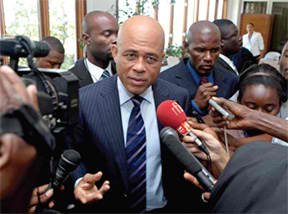
Photo (Le Matin)
Relationships between President Michel Martelly and the Haitian press took another nosedive on October 3, 2011 as the president launched his free education program for disadvantaged children at the National School of Tabarre, located 10 miles north of Port-au-Prince.
“Don’t do that,” Martelly told Germain Etienne, a young reporter of Radio Scoop FM. “If you persist, I’ll tell you…. your mother,” he lashed out. The president made those comments after Etienne asked if his Excellency was playing favoritism, paying more attention to foreign journalists’ questions than their Haitian counterparts’. The incident sent shock waves through the national press, questioning Martelly’s status as the first representative of the nation.
“I do not think President Martelly would insult me through my mother,” said Etienne shortly after the incident. However, the president maintained, “I did not like the way I was approached, so I answered, and that’s it,” brushing aside an avalanche of critics demanding respect for journalists and public apologies.
Underlining the injurious nature of Martelly’s comments on Panel Magik, a weekday program aired on radio station Magik 9, Monseigneur Pierre Andre Dumas explained, “The Haitian people share a profound respect and collective sensitivity for the mother figure.” Representing the Catholic Church in Nippe, Haiti, Dumas drew a parallel between the Virgin Mary and Haitian mothers to underline the symbolism of the incident. “We know one can throw many grave insults at the Haitian and he won’t get mad; however, when it comes to his mother,” continued Dumas, “He is not happy, regardless of the intent.”
This adversarial relationship between the executive and the press, hardly a new phenomenon, seems to erupt at events deemed important to Martelly and his young administration. A similar incident taken place earlier this year robbed the president of needed coverage during his national tourism and development week. Rather than the President’s initiatives, his infamous “shut up” sniped at the Haitian media, which he branded ‘enemy of tourism and development’ made the headlines around the country.
The more recent incident caught an impatient Martelly at his historic launching ceremony of his highly criticized free education program for Haitian children. Once again the headlines highlighted a bruised press victimized by a temperamental, bullying president, its freedom of expression trampled.
Dumas, a voice of reason, perceived the incident as a teachable moment noting, “When at the helm, full of responsibilities in a country that has many problems, many issues to deal with, one must learn to challenge and even transcend the self, then seek the greater interests of the nation.” However, President Martelly felt Etienne’s question was irrelevant. “Your question has nothing to do with the work I’m trying to do,” he said. “I’m focused on education, the rule of law, agriculture and defense forces. I have priorities, you know,” he added.
Meanwhile, the Association of Haitian Journalists and the National Association of Haitian Media issued statements denouncing the president’s actions as a direct assault on article 28.1 and 28.2 of the 1987 Constitution that guaranteed freedom of the press. Even Camille Leblanc, former Justice Minister during ex-President Rene Preval’s first term echoed journalists’ frustrations with Martelly’s hostilities toward the press. “If we weren’t talking about the president of the Republic,” she let out on radio show Ranmase aired on station Caraibes FM. “I would say it is idiocy pushed to the extreme,” she said.
Striking a conciliatory tone however, Monseigneur Dumas asserted:
Bonded by democratic principles, both entities must coexist to ensure the evolution of a healthy, vibrant democracy in Haiti, explained some observers. The executive must be able to implement policies deemed necessary to move the country pass its deplorable state, as does a robust, objective press whose responsibilities vary no less.
As the religious leader attempted to neutralize the acidic relationship between the president and the press, he explained that we were prone to make mistakes, but needed to have the courage to say “I’m sorry” and start over, building better relationships with everyone.